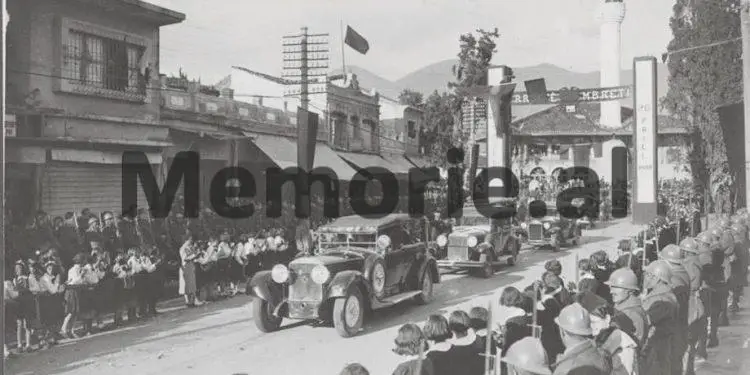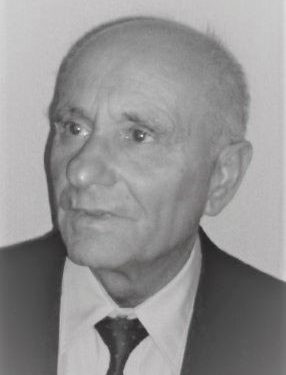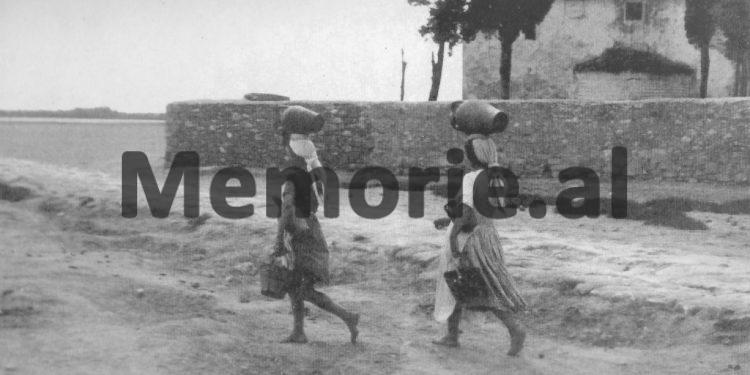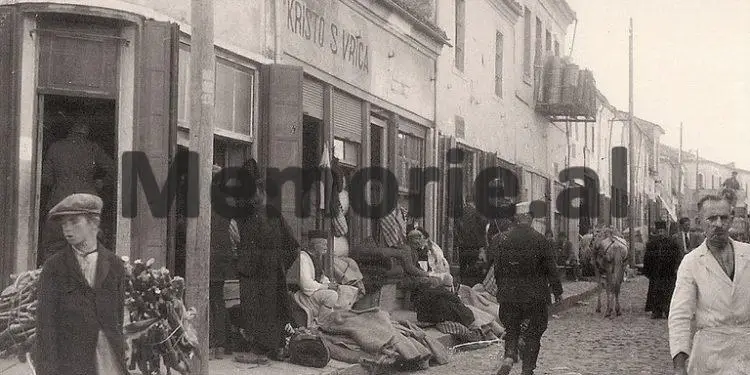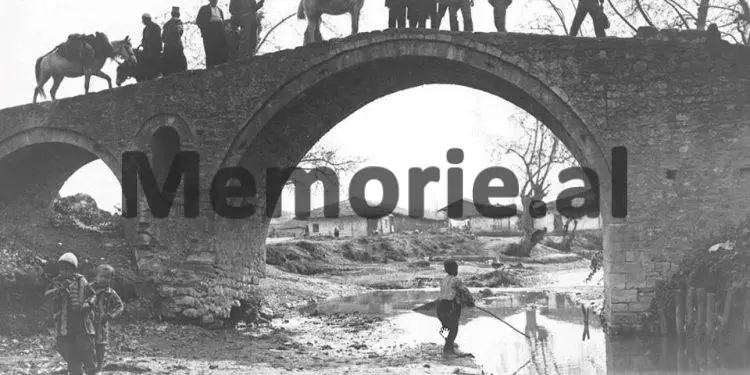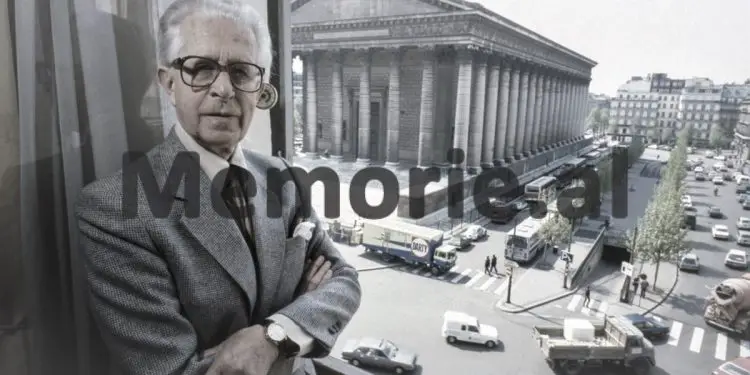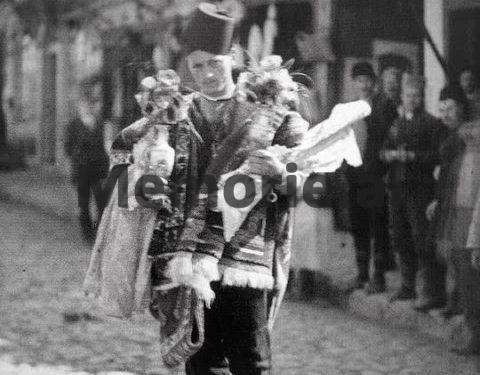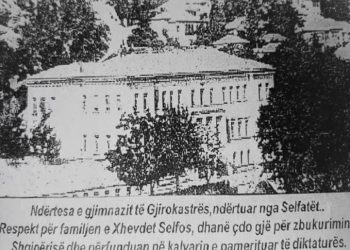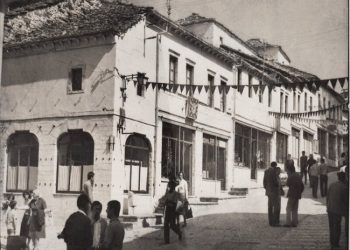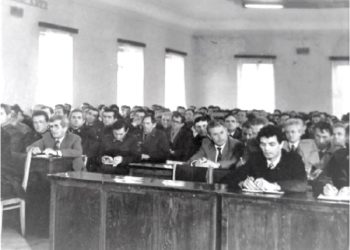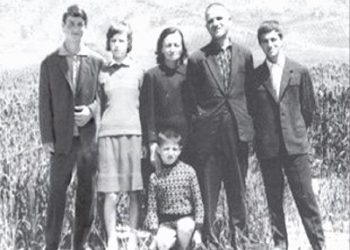By Sven Aurén
Translated by Adil N. Bicaku
Part twelve
ORIENTI EUROPE
Land of Albania! Let me bend my eyes
On thee, thou rugged nurse of savage men.
Lord Byron.
In the book “Orient of Europe”, the author of the work is the Swede Sven Aurén. They are impressions of traveling from Albania from the ‘30s. His direct experiences without any retouching.
In a word, the translation of the book will bring to the Albanian reader, the original value of knowing that story that we have not known and we continue to know it, and now distorted by the interests of the moment.
Now a little about what these lines address to you: My name is Adil Bicaku. I have worked and lived for over 50 years in Sweden, without detaching for a moment, the thought and feeling from our Albania.
I am now retired and living with my wife and children, here in Stockholm. Having been for a long time, from the evolution of the Albanian language, which naturally happened during these decades, I am aware of the difficulties, not small, that I will face, to give the Albanian reader, the experiences of the original.
Therefore, I would be very grateful if we could find a practical way of cooperation together, to translate this book with multifaceted values.
Morally, I would feel very relieved, paying off part of the debt that all of us Albanians owe to our Albania, especially in these times that continue to be so turbulent.
With much respect
Adil Biçaku
Continued from the previous issue
It seems as if the Albanians have borrowed this tradition of blood feuds from the Corsicans or the Arabs, but it must in itself be a rite, very ancient Illyrian, of those more stable types. Even in neighboring countries it is likely. According to Jirecek, blood feuds flourished in Dalmatia and Montenegro, cases of blood feuds were still common until the end of the 1800s. But Prince Danillo, managed through energetic action, to stop this terrible habit in this country. His method was the death penalty, and thanks to his great authority, he always found people who were willing to carry out the death penalty. In Albania the problem was different. The Turkish regime never succeeded in completely dominating the Albanian people, which was absolutely necessary to eradicate this habit.
The highlanders and Mirditors lived among their mountains and behind those forms, which their parents had taught them to live in, and ridiculed the gendarmes, when they presented themselves on the order of the Turkish Governor, for the abolition of blood feud. Besides her, this good Governor would gladly try to stop weddings or funerals, or other very strong traditions. Blood feud is a matter of honor and as soon as there is talk of honor, the Albanian is unshakable. It is no coincidence that all visitors to Albania, whenever they have traveled in the past, centuries or modern times, are equally impressed by the very unbelievable development of this sense of honor. In Albania it is an honor that makes a man, a man and a woman, a woman.
But this honor imposes great conditions on the individual and in many cases, requires blood feuds. Rape or kidnapping of a girl should be washed away with blood feuds, divorce or engagement, as well. Through an insult, the victim has “blood to take” and the same happens if the guest is harassed or killed. He, who has to regain the lost honor, must kill the one who offended him. But this did not resolve the dispute at all. The head of the family of the murdered must kill the one who initially demanded revenge and in this way, the blood feud continues for generations.
Jacques Bourcart, in his book “L´Albanie et les Albanais”, has some data with figures from 1920. At that time, it was estimated that the fury of blood feuds took on average 25 percent of men, of the tribes of the Northern population. The record was held by the T f tribe, which boasts 42 percent, a circumstance that has given rise to the well-known Albanian proverb: “Men are killed like pigs in T …………”! Sometimes it happens that the blood feud has turned into a regular war between the two tribes and in these cases, the death rates go even higher.
He who has fulfilled the claim of honor has killed the enemy, awaits him without exception, a terribly difficult future. If he is poor and has no manor of his own, he should flee to other provinces, where the opponent cannot find him. If he is a landowner, he barricades himself in his tower, the fortified part of the rich man; he takes other security measures and rarely goes out without a guard with him. Blood feuds hang over his head all the time, like the sword of Democletus.
If the blood feud starts between the two tribes, then there are even more moments of uncertainty. Outside of nature it can easily happen that a tribal member meets someone he does not know. What tribe are you from? Ask the stranger with the rifle towards the other and at the request of honor and unequivocally, the name of the tribe should be said. To be silent is a coward, to lie is dishonest, as honest, and this is a cause for blood feud. If the stranger is from the tribe with whom the respondent is in blood, then the response is immediately followed by a bullet. But no less interesting are the strange laws of the custom of blood feud, which decide on exceptions and ceasefire. Here you face another aspect of the Albanian character.
First of all women, clergy and children under the age of sixteen, are absolutely excluded from the consequences of blood feuds. The provision on age has an interesting consequence. It may seem that a man dies before the opponent, has the opportunity to ask for blood and without leaving any grown boy. Maybe the family has only the widow and a number of minor children. He who has “blood to take” must calm down and wait until the boy is sixteen years old. It so happened that the victim thus waited fifteen years, that on the sixteenth birthday, to be killed by a bullet. But the mother knows what awaits her son and does not neglect to educate the son for care and attention.
Hospitality also annuls blood feuds, because hospitality is an institution almost of a religious nature. He, who kills the enemy over time, that he is a friend in a house, has committed a horrible unforgivable deed, which excludes him from the laws of tradition. The hospitality is extremely meticulously formulated. This has brought about this strange effect, if the victim encounters the opponent outside, but manages to enter the territory of the enemy’s house, before firing his rifle, and then he has escaped. At least in this case.
In the house of the enemy, he is welcomed as a much respected friend, he is treated to the best bread that the house has the opportunity and he is honored, by all means. The coffee evaporates quite peacefully into the cup and the conversation goes quite quietly, pleasantly and in a polite manner. Not the slightest sign or word alludes to the hostile relationship that the friend has towards the master of the house. But when he leaves the master of the house, he must be careful. Otherwise he has the bullet in his back, the moment he goes out the door and hears the humane greeting of the owner of the house: “Long live your lives”! To sound in the ear.
But the most important limitation in the possibilities of blood feud is besa, this Albanian oath, which has a specially complicated content. Besa means at the same time respect for the truth, security, ceasefire and loyalty, in the agreements made. This is an almost irreversible word, whose effects are easier to explain than its meaning as a word. When Prince Wied ascended the throne, he solemnly proclaimed the oath. This meant that he swore to respect the lives of his subjects, property and rights. When he mistakenly ordered the soldiers to shoot, over the loyal subjects, he caused a great deal of grief. The prince was not an honest man. He had broken the promise, the word of honor.
Besa was used in many different ways. It may happen that in understanding to give the pledge, for a road in a province and the one, who takes the blood, in a road of this province, is a dishonest man. Just as dishonest that he is not able to kill the enemy in those places that are allowed for him. Trusts can also be made in an entire part of the country. This method was used with some success, by some Turkish governors, who wanted to calm down the effect of blood feuds. The blood feud was automatically abolished then and the quarrels were settled through economic reparations, where the governor received a fat percentage.
The trust served for a short time and had to be renewed, before the expiration date with the approval of the parties, which could be quite difficult to achieve. But for the Turkish governors, the significant meaning of honor did not have the same meaning as for the Albanians. When the blood feud and consequently the percentage decreased, the governors found it more appropriate to inflate the blood feud again. After 1884, no new faith was proclaimed, and a few years later, almost every northern Albanian lived in the wake of the private war. In Shkodra alone, over five hundred Albanians sought protection, a very precarious defense against blood feuds.
I have no reason to doubt the data of Vlora, regarding the energetic action of King Zog, against the Albanian country. But it is also certain that the authorities have done what is possible, with this difficult task, it is also certain that the law of blood feuds is fully and completely respected, in the wild mountains. That the number of blood feud tragedies has decreased, so much, so it is not believed to depend on the law of the death penalty. There is something that the Albanian is afraid of, it is not death. But the reduction is as a result of the great disarmament action, which with great difficulty, was achieved two or three years ago.
The government has banned civilians from making weapons and -mirable dictu! – has also managed to gain strength after the decision. What it means, to deprive the Albanians of the opportunities of defense, is clearly understood at once for the one who has the slightest idea in the history and character of the Albanian people. This is something unheard of. No less than 200,000 weapons are stored in government warehouses in Tirana, which have been confiscated by disarmament expeditions. This is certainly the greatest success that King Zog has had during his eight-year rule, a success that clearly shows that this Albanian King is a man who stands above the masses. The great disarmament means that the Albanian Monarchy is something to be reckoned with.
But an effective end to bloodshed cannot be achieved either through legal provisions or by disarmament. The understanding of the old gene-ration, on honor and dignity, justice and injustice, is something immovable and rigid. Only through the path of information, that victory must be achieved. The next generation will declare permanent allegiance to Albania. Besa is used to gather the people in the war, against foreign invaders, why cannot it be used even as a weapon in the service of labor, to build the country?
In anticipation of this national solidarity that constitutes besa, lives always blood feud. This is seen from the admission of the foreign secretary himself. And from piles of mortar and blood stains outside Lumo Skendo’s bookstore.
At the dinner of the same day of the fresh event in Albania, of the unacceptably tragic blood feud, there was more liveliness than usual in the many cafes of Tirana. When the shrill voice of the imams, calling for meditation and prayer, sounds for the last time, from the crowns of the minarets, the caretakers and the chief of the Royal Electricity Authority, let out the dim light of the streets, find no empty table. Along the Boulevard “Zog”, where those giant carts pass by, to evoke the memories of the last century, we went from one cafe to another, but everywhere there were crowds of people.
Heartbroken men chatted diligently, and the filthy gray smoke of tobacco hung like a ragged cloth over the white and black keys. In many countries, radio artisans, which are otherwise the biggest annoyance of foreign visitors, were even shut down. From the gestures and the tone of voice, we could see that the waves of discussion were going high. But it was difficult to discern any clear expression. It was repeated without stopping, in different tones and nuances: bloody.
Bloody is bloodthirsty!
We finally managed to push ourselves inside a corner of a small dark café, where the gentleman roamed around, like a juggler with four cups of coffee in a row, on his left arm and under his armpit. From his right arm, there was only one stump left. Maybe it had to do with bloodthirsty, but we did not ask for information about it, despite the fact that as a result of a few years, living in the US, spoke understandable though primitive English. We thought that such a question would not be human at all. Albanians have a great claim to courtesy. On the other hand we asked how in general, the big event of the day was commented.
“It is considered a scandal that the result of the attack of five men on a single opponent should have caused the death of two ordinary people,” he replied, and he found himself really ashamed. This seemed to be the only moral view he added. The issue of blood feuds as such, was a private matter of their own; a matter of honor, those others did not have to interfere with. But to shoot so bad…!
A little later he came and sat at our table, asked us to rent him, with a cup of coffee from his coffee and we found him, as a good and far-sighted man with beautiful dreams for the future of Albania, for progress and culture and workforce growth. But the conversation was generally about the special event of the dinner, and so we talked, more about the blood feud. Among many others, he told us this story which made us, to summarize a small part of the soul of Albania:
This was immediately after the end of World War II. During the general storm that reigned in the country before the borders were not yet established and the form of government was not definitively worked out, the Yugoslavs took the opportunity to occupy the northern part. Those young gentlemen, of course, wanted to be energetic and progressive, so they issued a decree, according to which all bloodshed must be completed within six months, that then the Yugoslav state, intends to take the strictest measures. The decree quickly became generally known.
Now six months is not a long time, at least not for an Oriental and especially not for an Oriental with blood feud obligations. There was a nervous rush up into the highlands. People cleaned their rifles, shot, crackled and tried to save themselves, by all means. Worse was for those whose opponents had moved to other parts of the country. There was no other option but to take the long and difficult roads. And especially the most difficult, was for the excellent tribe of Mirdita, who had already immigrated to America a year ago. He had no choice but to sell the few things he had and put them behind him, because like members of other tribes, they were fully convinced that the high Yugoslav decree was valid not only for Albania, but for all the world.
The men, who wanted to preserve their honor, before it was too late, went to the great country in the West and began to look for their victims, which did not cause them much trouble, because the Albanian colonies in America are quite united. He discovered that he, who wanted to kill, was making a living as a salesman at a small grocery store outside the village and went to where he was. With a revolver in his hand, he entered the store and greeted his patriot and said:
-You know what it for…?!
But that death row inmate, who had become quite Americanized over the years abroad, calmly replies:
-Just a minute, please! He, in fact, has to serve a lady, who has just entered, a pack of figs.
Such great composure, I could not stand this man in question. He threw his revolver at the counter, threw it at the opponent’s neck, and burst into tears.
The coffee master took a deep breath and released a glance at the bar, to see if there was anyone who wanted more coffee. But there was no one who noticed him. The discussion continued unabated just as diligently and the topic was still about bloodshed.
-Now it is said that he is employed in the store, I heard, he concludes his story and adds thinking: however, America is a good country…!
-Undoubtedly, whispering to us affected, in that new situation he ´ found the blood feud very inhuman…!
He looked up, surprised for a moment:
-Yes, it was not so much that I was thinking. But how to find a good job without anything…! /Memorie.al




